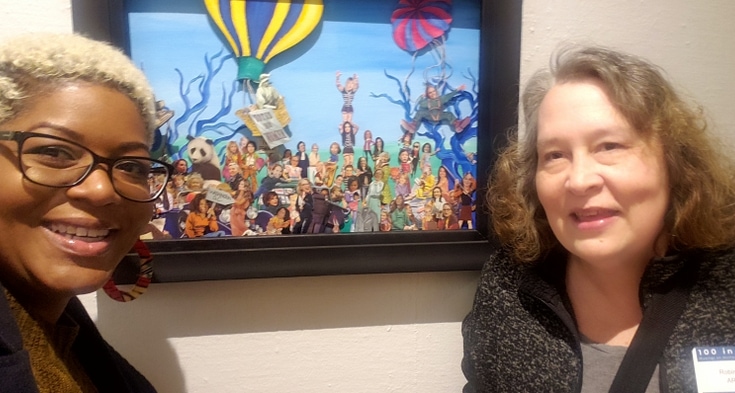When your health care provider lands you a new home

After years of misdiagnoses, Robin Wyatt took her daughter, Alex Hendrix, now 21, to Novant Health Maplewood Family Medicine for a battery of tests. They left with a diagnosis – and eventually got a new home.
“Alex has always had strong reactions to certain things that she and I didn’t understand,” Wyatt said. “Loud noises can send her into a panic. She suffered from frequent migraines. Her perceptions are different. She was misdiagnosed with ADHD through the school system.”
While mother and daughter were looking for answers, they were enduring a housing nightmare. They were living in a dilapidated, vermin-infested apartment complex in Winston-Salem, North Carolina. The complex was scheduled for demolition to make way for a new apartment complex on the same site. Residents – about 150 families – got eviction notices in January. They were given 60 days to vacate. Wyatt doesn’t have her own transportation, so finding a new home was daunting.
And then something good happened: Wyatt was referred to Tyra Jones, a Novant Health community health worker, in November 2019. From her view, it seemed like being assigned a guardian angel. Jones’ job is helping people – not just with health care, but with housing, finances, insurance and nearly anything else that impacts their well-being.
She’s part of a team that connects at-risk Novant Health patients and their families with crucial resources they may not know about. It’s part of Novant Health’s commitment to treating the whole patient and helping eradicate health care disparities that persist along socioeconomic, and often racial, lines.
Community health workers are navigators assigned – often through a referral from Novant Health case management or the emergency department – to clients for a three-month period. The goal is to connect them to community resources and help them navigate what can be unwieldy bureaucracy. Jones and her colleagues offer help – but they also teach self-sufficiency.
Jones got right to work. Wyatt had warned her about the mold in their apartment, but Jones, pregnant at the time, visited anyway. She couldn’t believe what she saw. “It was shocking,” Jones said. “I could smell mold from outside. There was a hole in their ceiling from water damage. There were rats. They were paying $700 a month, and they were model tenants – never late with the rent. It is shameful that they had to live in these conditions.”
Because of the mold, Jones and Wyatt met each week at McDonald’s. (While Jones makes “house calls,” some of her clients are homeless or in unsafe housing. She’s accustomed to meeting people wherever it suits them.) The first order of business was making sure Hendrix got the help she needed. But the housing crisis was also urgent. Jones helped the family get a one-week extension to buy them some time.
“We were close to being homeless,” Wyatt said.
Feeling invisible
It’s something Jones understands. “I grew up in extreme poverty,” she said. “I have lived in a homeless shelter. Poverty affects kids in extreme ways. I think my clients know, when they meet me, that someone in this world sees them. I can’t wave a magic wand, but I do understand what it’s like to feel invisible.”
Jones fast-tracked Hendrix so she could get a diagnosis without further delay. She has depression and anxiety and is also on the autism spectrum. She’ll soon start receiving help from a psychiatrist, is trying different medications and participates in vocational rehabilitation.
Wyatt credits Jones with making it happen – starting with access to healthcare after Hendrix lost her insurance: “Tyra’s intervention on our behalf paved the way for us not only to move into a safe home but, perhaps more importantly, get a diagnosis that provides Alex with understanding and hope for her future.
“We are learning how to manage,” Wyatt continued. “It feels good to finally have a diagnosis that makes sense. Alex has always felt different, but she didn’t articulate it. She never felt she could. Now, she knows it’s OK to talk about how she feels.”
Jones helped them find livable housing. After striking out with apartment complexes all over town, she found something suitable from a surprising source – the very management company that evicted the family.
“I don’t know why they didn’t offer that option when they sent eviction notices,” Jones said. She intervened and advocated on their behalf; she even asked that the family not be charged a security deposit since Wyatt had a spotless payment history.
“We met with Tyra once a week,” Wyatt said. “I was usually feeling overwhelmed, but after each hour-and-a-half meeting, we had new vigor. “Alex has had a hard time with a lot of healthcare people,” Wyatt continued. “But right away, she felt comfortable with Tyra. We knew she was on our side.” “We adore her,” Wyatt said of her guardian angel. “We feel extremely lucky that Novant Health connected us with people who could help Alex the most.”
The feeling is mutual. Jones said Wyatt is educated, artistic, involved in her community. She wants to contribute to society. “She’s become an advocate for herself,” Jones said. “I’m in awe of her. She is so much stronger than she knew.”